Video Game Tester Jobs: High – Income Opportunities in the Gaming Industry
Video game tester jobs offer a unique opportunity to combine a passion for gaming with a career in quality assurance. These roles involve playing games before they’re released to find bugs, glitches, and other issues. Video game testers typically earn between $13 and $20 per hour, with opportunities available at various companies across the industry.
Getting started in game testing often requires a mix of gaming skills, attention to detail, and the ability to communicate clearly about problems found. Many job listings for game testers ask for experience with different gaming platforms and genres. Some companies also look for familiarity with testing tools and bug tracking software.
For those interested in pursuing this career path, there are several ways to gain experience. Some aspiring testers start by signing up for playtesting platforms that connect game developers with testers. Others may look for entry-level positions at game studios or quality assurance firms that specialize in gaming.
Key Takeaways
- Game testing jobs combine gaming passion with quality assurance skills
- Entry-level positions often require attention to detail and clear communication
- Gaining experience through playtesting platforms can help start a game testing career
Understanding Video Game Testing
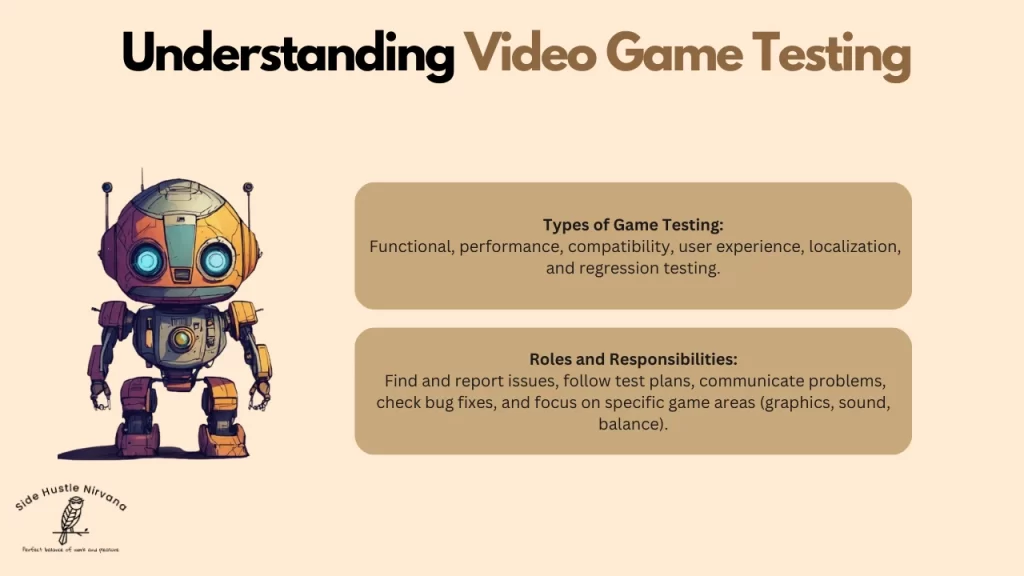
Video game testing is a crucial part of game development. It involves finding bugs, checking gameplay, and making sure games are fun. Testers play different roles and use various methods to ensure games work well.
Types of Game Testing
Game testers use several testing types. Functional testing checks if game features work as planned. Performance testing looks at how the game runs on different devices. Compatibility testing makes sure the game works on various platforms.
User experience testing focuses on how fun and easy the game is to play. Localization testing checks translations and cultural elements. Regression testing looks for new bugs after changes are made.
Roles and Responsibilities of a Game Tester
Game testers play games to find and report issues. They follow test plans and create detailed bug reports. Testers must have strong attention to detail and good communication skills.
They work with developers to explain problems and suggest fixes. Testers also check if previous bugs are fixed. They may test specific game areas like graphics, sound, or multiplayer modes.
Some testers focus on game balance and difficulty. Others test for cheats or exploits. Testers often work long hours, especially near game release dates.
Getting Started in Game Testing
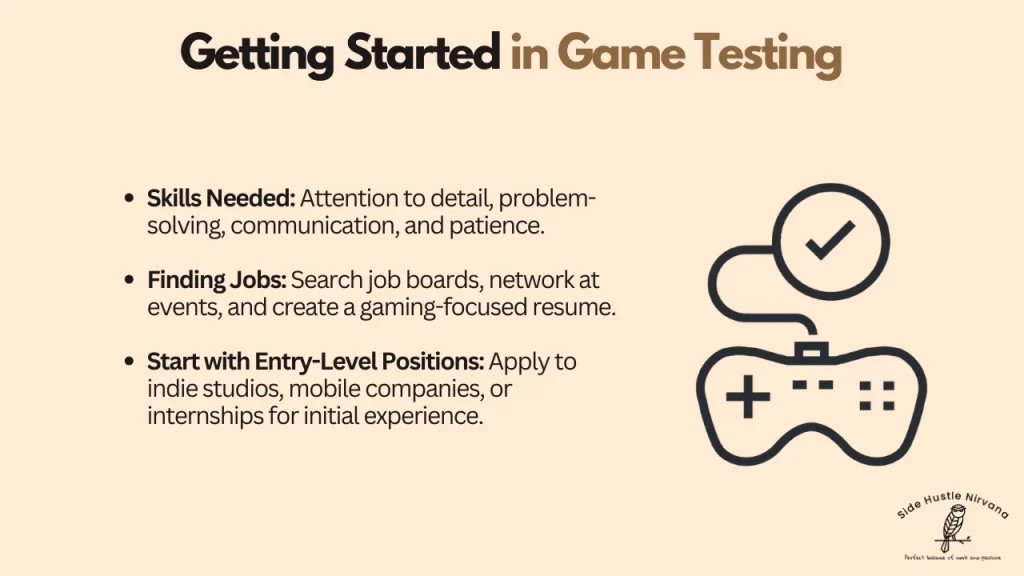
Game testing is an exciting entry point into the video game industry. It requires a mix of skills and knowledge about games and testing processes. There are ways to find jobs even without prior experience.
Qualifications and Skills Required
Game testers need strong attention to detail and problem-solving abilities. A love for playing video games is important, as testers often replay sections repeatedly. Good communication skills are vital for reporting bugs clearly.
Basic computer skills are necessary. Knowledge of different gaming platforms and genres is helpful. Some companies prefer testers with experience in specific game engines or programming languages.
Patience and persistence are key traits. Testers must be able to focus for long periods and handle repetitive tasks.
How to Find Entry-Level Jobs
Many game companies offer entry-level tester positions. Job boards like Indeed or GameJobHunter often list these openings. Networking at gaming events or online forums can lead to opportunities.
Creating a gaming-focused resume is important. Highlight any relevant skills or experience, even if not professional. Some testers start with part-time or contract work before moving to full-time roles.
Applying to smaller indie studios or mobile game companies can be a good way to gain initial experience. Some larger companies offer internships in QA departments.
Being willing to relocate can open up more job prospects, as many testing jobs are on-site.
Finding Game Tester Job Vacancies
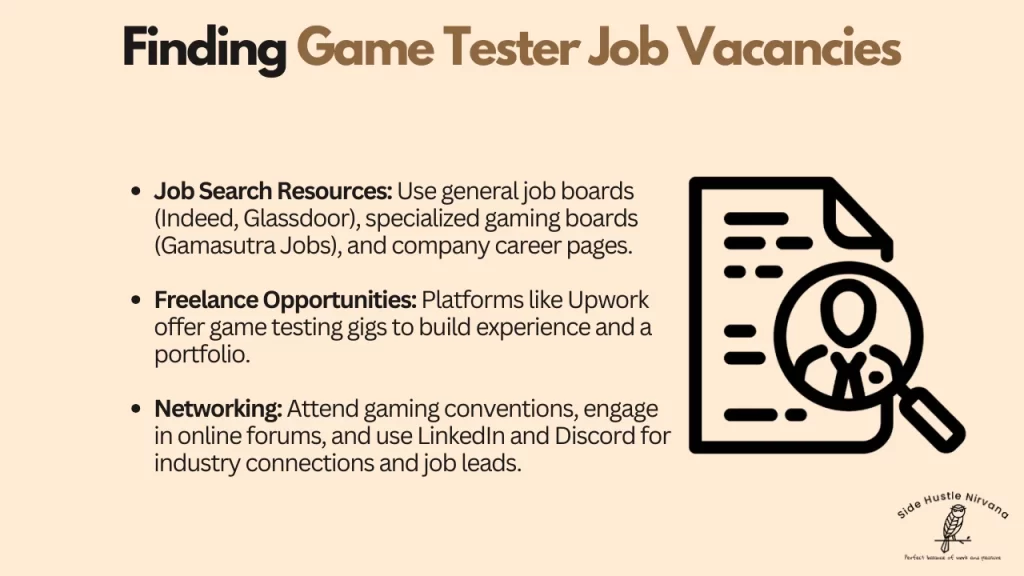
Game tester jobs can be found through online job boards, company websites, and industry connections. The gaming industry offers opportunities for both entry-level and experienced testers.
Resources for Job Searches
Video game tester jobs are often listed on general job sites like Indeed and Glassdoor. These platforms allow you to search for openings using keywords like “game tester” or “QA tester.”
Specialized gaming job boards such as Gamasutra Jobs focus exclusively on the gaming industry. They often have a dedicated section for QA and testing positions.
Many game companies post job vacancies directly on their websites. Check the careers pages of major game developers and publishers regularly.
Freelance platforms like Upwork offer game testing gigs, which can be a good way to gain experience and build a portfolio.
Networking in the Gaming Industry
Attending gaming conventions and events can help testers meet industry professionals and learn about job openings. These gatherings often include career fairs or networking sessions.
Online gaming forums and communities can be valuable for connecting with other testers and developers. Participating in discussions can lead to job leads and industry insights.
LinkedIn is a powerful tool for professional networking in the gaming world. Following game companies and joining gaming-related groups can help testers stay informed about new opportunities.
Industry-specific Discord servers and Slack channels often have job posting sections where companies advertise game tester vacancies.
Working as a QA Game Tester
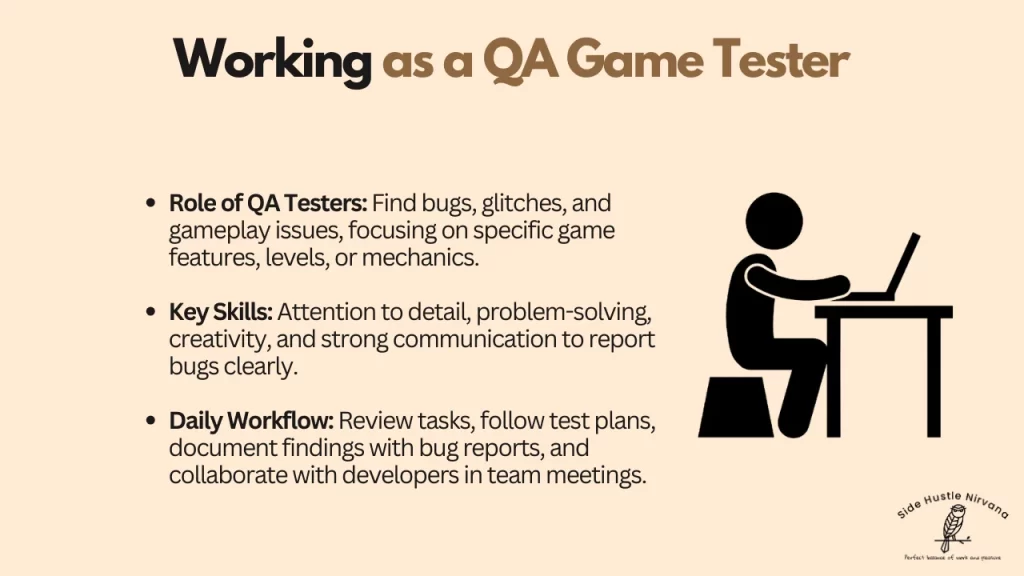
QA game testers play a crucial role in game development. They find bugs, ensure gameplay quality, and help create polished final products. Their work requires attention to detail, problem-solving skills, and a passion for gaming.
Understanding Quality Assurance in Games
Quality assurance game testers are responsible for testing video games before release. They check for bugs, glitches, and other issues that could affect the player experience. QA testers must have a keen eye for detail and be able to spot even minor problems.
Testers often work on specific game features or levels. They may focus on character movements, item interactions, or game physics. QA testers need to think creatively to find potential issues players might encounter.
Communication skills are important for QA testers. They must clearly describe bugs and provide steps to reproduce them. This helps developers fix issues efficiently.
Daily Workflow of a QA Tester
A typical day for a QA game tester starts with reviewing assigned tasks. Testers may work on new features, retesting fixed bugs, or exploring the game for unexpected issues.
Testers often follow test plans or checklists. These guide them through specific scenarios to check. They might test different difficulty levels, game modes, or multiplayer functions.
Documentation is a key part of the job. Testers write detailed bug reports, including steps to reproduce issues and screenshots or videos. They may use specialized software to track and manage bugs.
QA testers also attend team meetings. They discuss progress, share findings, and plan future testing strategies. Collaboration with developers and other team members is common.
Exploring Remote Game Tester Opportunities
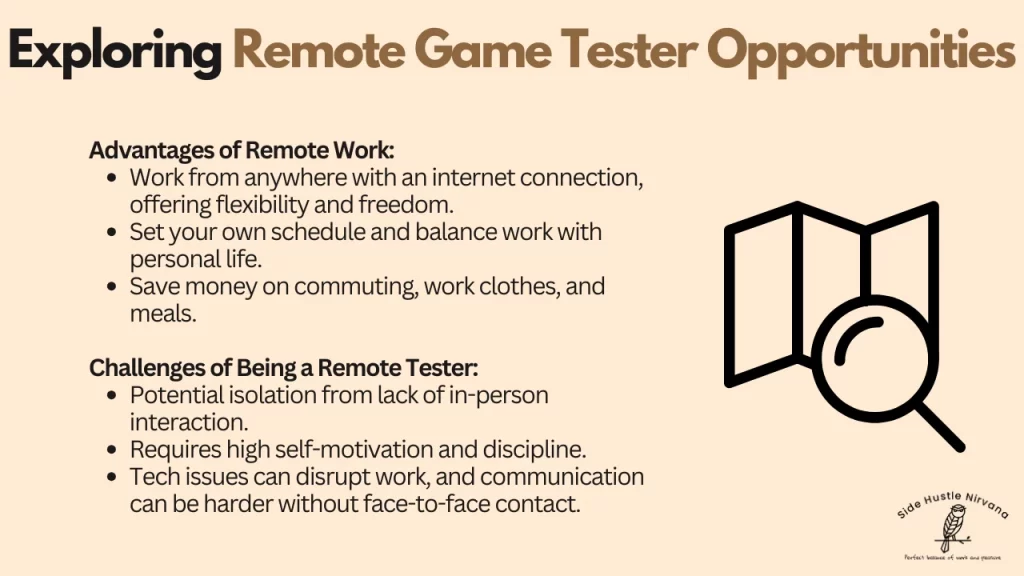
Remote video game tester jobs are becoming more common. This allows testers to work from home while playing games to find bugs and issues. There are both good and bad parts of being a remote game tester.
Advantages of Remote Work
Remote game testers can work from anywhere with a good internet connection. This gives them more freedom in their daily lives. They don’t have to spend time or money commuting to an office.
Online video game tester jobs often have flexible hours. Testers can set their own schedules as long as they meet deadlines. This makes it easier to balance work and personal life.
Remote testers can save money on work clothes and lunches out. They also avoid office distractions and can focus better on testing games.
Challenges of Being a Remote Tester
Working alone at home can feel isolating for some remote testers. They miss out on in-person chats with coworkers and team bonding.
Remote testers need to be very self-motivated. There’s no boss looking over their shoulder to keep them on task.
Tech issues can be frustrating. Slow internet or computer problems can make testing harder. Remote testers need good problem-solving skills.
Communication can be trickier for remote video game QA testers. They must clearly explain bugs in writing or video calls instead of showing them in person.
Remote testers may have a harder time getting noticed for promotions. They need to put in extra effort to stand out to managers they rarely see face-to-face.
The Gaming Platforms Landscape
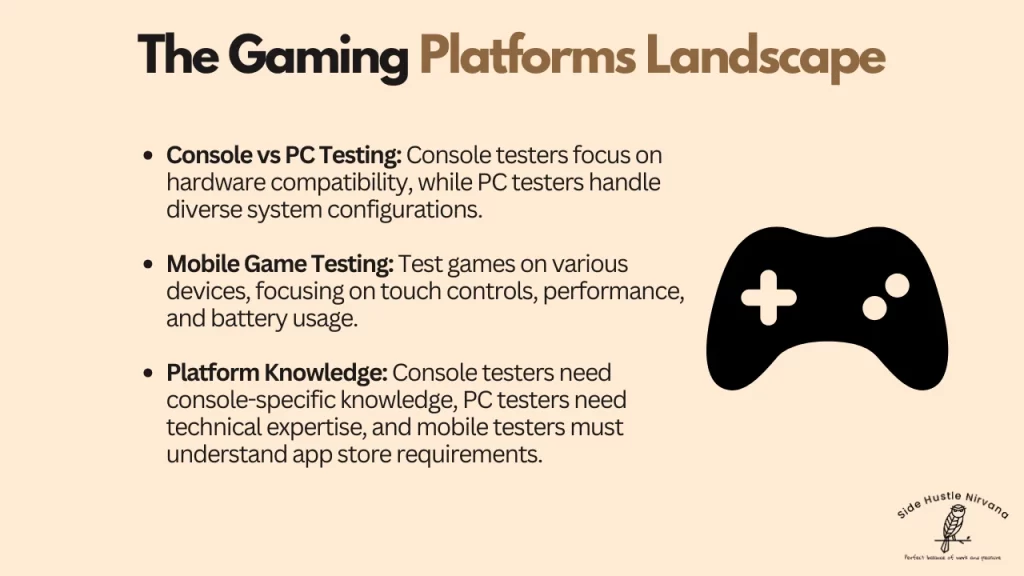
Game testers work across different gaming platforms. Each platform has its own testing needs and challenges. Testers must adapt their skills to match the specific requirements of console, PC, and mobile game testing.
Console vs PC Testing
Console game testing focuses on specific hardware like PlayStation, Xbox, and Nintendo systems. Testers check for compatibility issues and performance on each console model. They also test online features and multiplayer modes.
PC game testing involves a wider range of hardware configurations. Testers must check games on different operating systems, graphics cards, and processors. They look for bugs related to various PC setups and ensure smooth gameplay across different specs.
Console game tester jobs often require familiarity with the latest console features. PC testers need broader technical knowledge to handle diverse computer systems.
Mobile Game Testing
Mobile game testing has unique challenges due to the variety of devices and operating systems. Testers check games on different screen sizes, from small phones to large tablets.
They test touch controls, device-specific features, and how games perform with limited processing power. Mobile testers also look at battery usage and data consumption.
Video game testers in the mobile space need to understand app store requirements and mobile gaming trends. They often test games on both iOS and Android platforms to ensure consistent quality across devices.
Advanced Careers in Game Testing
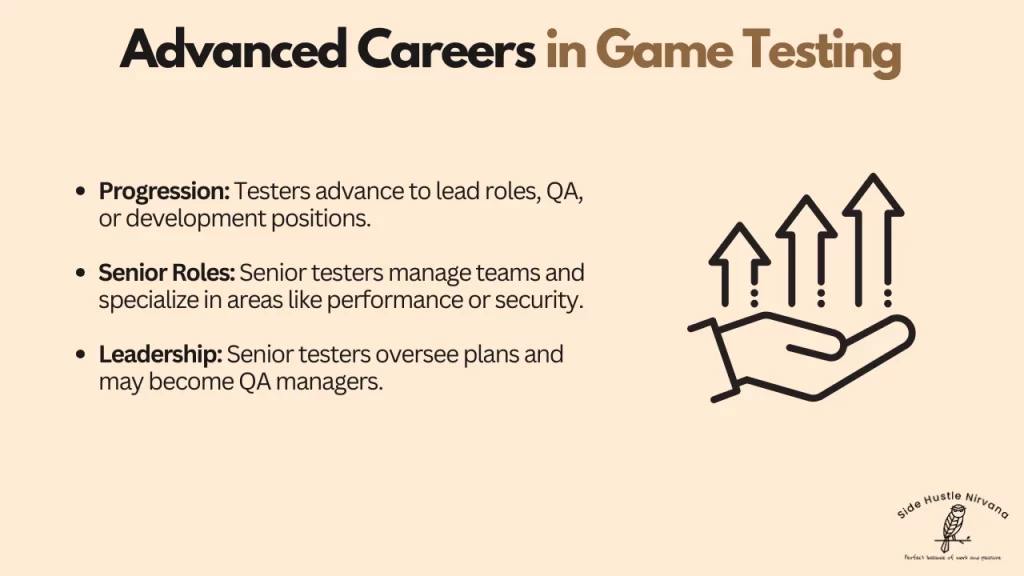
Game testing offers paths for growth and specialization. Testers can move into senior roles or explore different testing areas as they gain experience.
Progression Pathways
Testers can advance by improving their skills and taking on more responsibilities. Many start as entry-level game testers and move up to lead tester positions. Some focus on specific game types or platforms.
Quality assurance (QA) is a common next step. QA testers look at the whole game and how parts work together. They often need coding knowledge to find deep bugs.
Some testers become developers or designers. Their testing background helps them make better games. Others move into project management, guiding test teams and working with other departments.
Senior Tester Roles
Experienced testers can take on leadership roles. Senior testers train new staff and manage test plans. They work closely with developers to fix complex issues.
Quality assurance testers may specialize in areas like performance or security. They use advanced tools to find hidden problems. Senior QA roles often involve creating test strategies for entire projects.
Test leads oversee teams and report to producers. They make sure testing meets project goals and deadlines. Some become QA managers, handling budgets and long-term planning for game quality.
Understanding Video Game QA
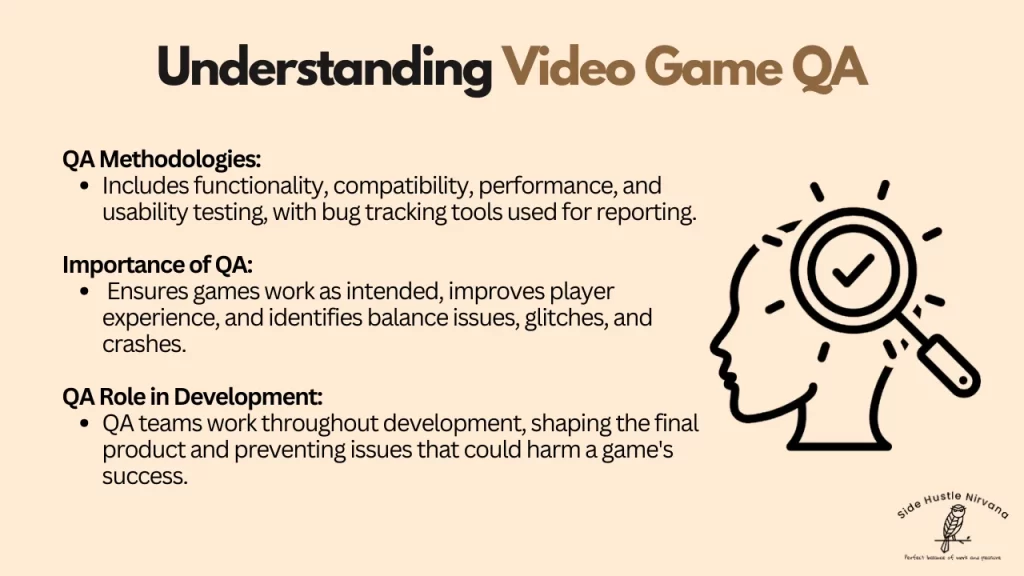
Video game quality assurance (QA) is vital for creating enjoyable, bug-free games. QA testers play a key role in finding and reporting issues before release.
Quality Assurance Methodologies
Video game QA testers use various methods to check games for problems. They create test plans that outline testing goals and processes. Testers play through games multiple times, trying different scenarios.
Some common QA methods include:
• Functionality testing • Compatibility testing • Performance testing • Usability testing
QA teams use bug tracking tools to report and monitor issues. They work closely with developers to fix problems. Testers need strong attention to detail and knowledge of game mechanics.
The Importance of QA in Game Development
QA is crucial for producing high-quality games. It helps catch bugs early, saving time and money. Game quality assurance jobs involve more than just playing games.
QA testers:
• Ensure games work as intended • Improve player experience • Identify balance issues • Check for crashes and glitches
Good QA can make or break a game’s success. It helps prevent bad reviews and unhappy players. QA teams work throughout development, not just at the end. Their feedback shapes the final product.
Mastering the Tools and Software
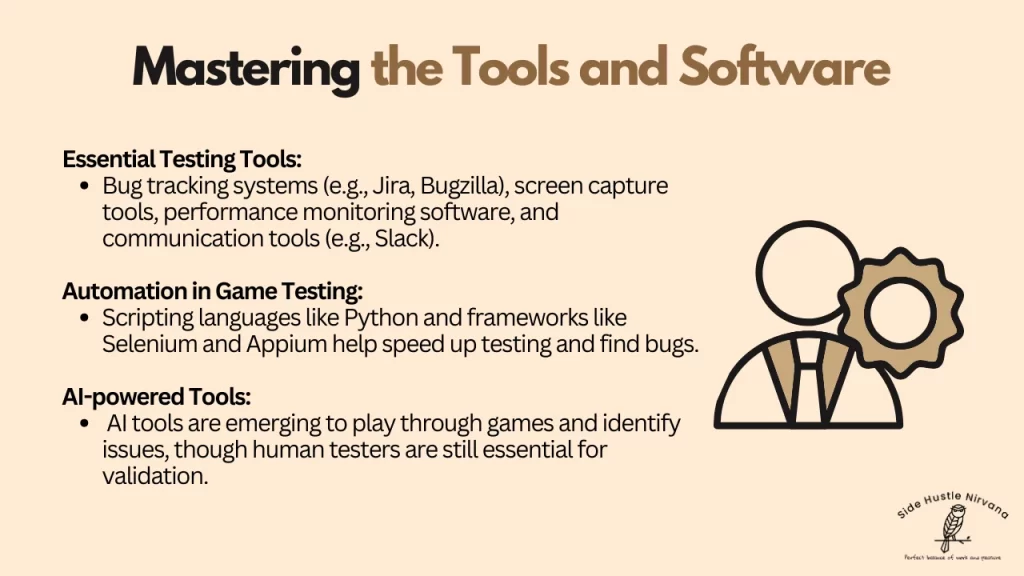
Game testers need to become experts with various testing tools and software. These help find bugs and ensure games work well across different devices.
Essential Testing Tools
Bug tracking systems like Jira and Bugzilla are key for testers. They let teams report and manage issues easily. Screen capture tools record gameplay to show problems. Testers also use performance monitoring software to check frame rates and load times.
Communication tools like Slack help testers talk to developers quickly. Version control systems track code changes. Testers need to know how these work.
Some common testing tools include:
- TestRail for test case management
- Charles Proxy for network analysis
- Fiddler for web debugging
Testers should practice with these tools often to use them well.
Automation in Game Testing
Automation helps testers work faster and find more bugs. Scripting languages like Python let testers write code to test games. This checks things like menus and basic gameplay.
Test automation frameworks run these scripts. Popular ones include Selenium and Appium. They work for many game types.
AI-powered testing tools are new but growing. These can play through games to find odd behavior. But human testers still need to check the results.
Testers should learn some coding to use automation well. Even basic scripts can save lots of time. Many online courses teach game testing automation.
Nurturing Your Passion for Gaming
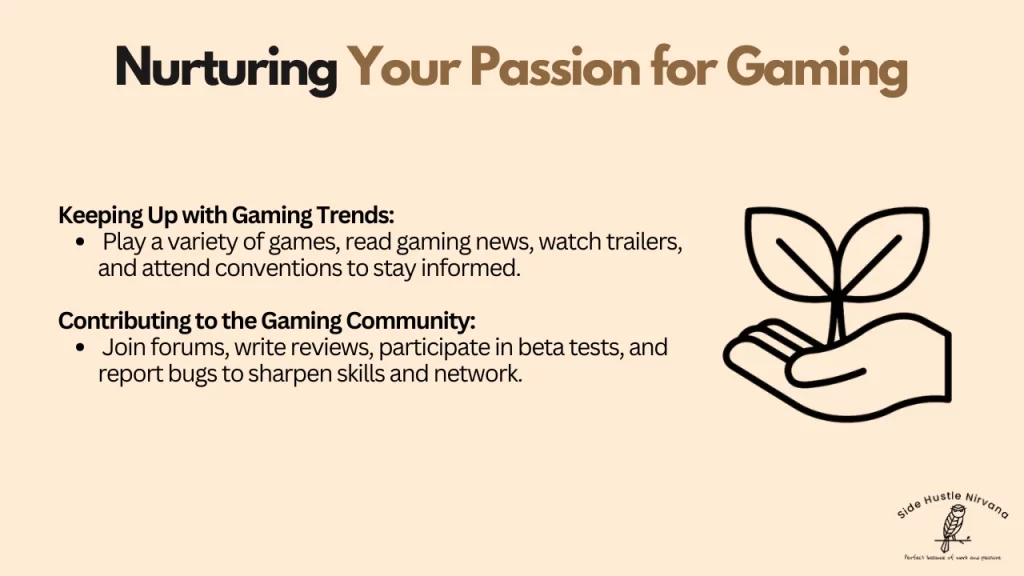
Keeping up with gaming trends and contributing to the community are key ways to nurture your passion for gaming. These practices help you stay connected to the industry and enhance your skills.
Keeping Up with Gaming Trends
Video game testers need to stay informed about the latest developments in the gaming world. They can do this by:
- Playing a wide variety of games across different platforms
- Reading gaming news websites and magazines
- Watching game trailers and gameplay videos
Attending gaming conventions and expos can also provide valuable insights. These events often showcase upcoming titles and new technologies.
Testers should pay attention to popular game mechanics, art styles, and storytelling techniques. This knowledge helps them understand what players enjoy and what developers are focusing on.
Contributing to the Gaming Community
Active participation in the gaming community can boost a tester’s skills and network. Here are some ways to get involved:
- Join online gaming forums and discussion boards
- Write game reviews or create gameplay videos
- Participate in beta testing programs for upcoming games
Attending industry events can help testers connect with other professionals. These connections may lead to job opportunities or valuable industry insights.
Testers can also contribute by reporting bugs and giving feedback on games they play for fun. This practice sharpens their testing skills and demonstrates their passion for improving games.
The Future of Game Testing
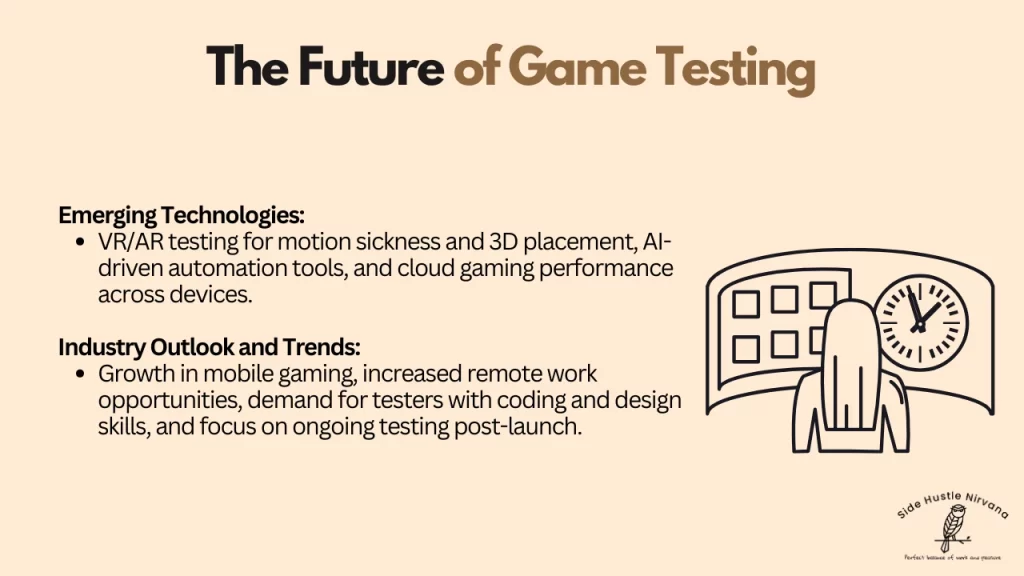
Game testing is evolving with new tech and changing industry needs. Testers will need to adapt their skills and methods to stay relevant in this fast-paced field.
Emerging Technologies
Virtual reality (VR) and augmented reality (AR) are changing game testing. Testers now need to check for motion sickness and proper 3D object placement. They must ensure smooth user experiences in virtual worlds.
AI and machine learning are also impacting testing. Automated testing tools are becoming more common. These tools can find basic bugs quickly, letting human testers focus on complex issues.
Cloud gaming is another key trend. Testers must now check game performance across different internet speeds and devices. They need to test for lag and connection issues.
Industry Outlook and Trends
The game industry keeps growing, which means more testing jobs. Mobile gaming is especially booming. Testers need to check games on many phone models and operating systems.
Remote work is becoming more popular for game testers. This opens up job options for people in different locations.
Testers now need wider skill sets. Knowledge of coding and game design is becoming more valuable. Quality assurance testers with specialized skills are in high demand.
Game companies are focusing more on long-term testing. They want to catch bugs in live games quickly. This means more ongoing testing jobs after a game launches.
Frequently Asked Questions
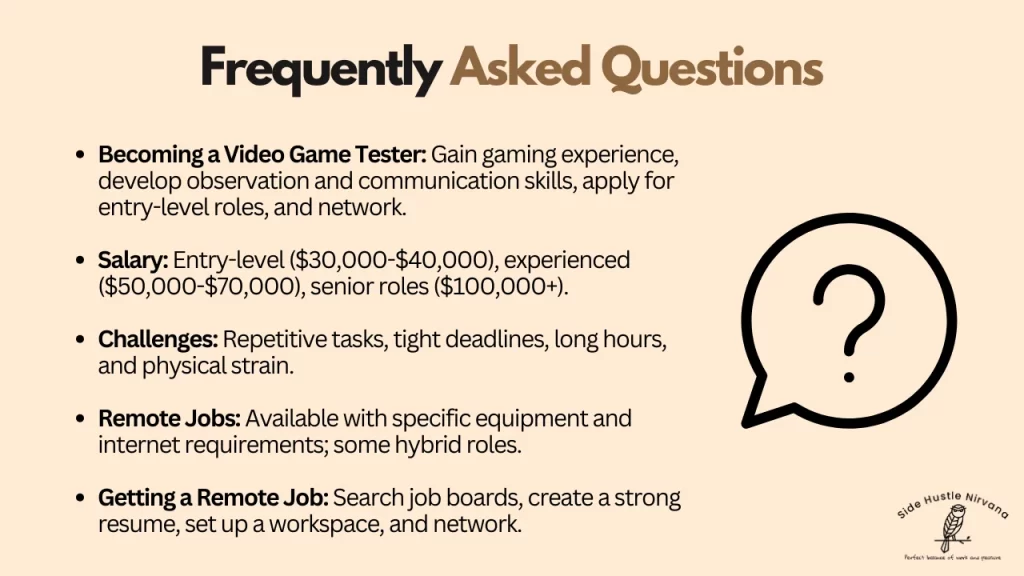
Video game testing jobs spark curiosity among gamers and job seekers alike. These questions address key aspects of becoming a tester, compensation, qualifications, challenges, and remote work options.
How can I become a video game tester?
To become a video game tester, start by building a strong foundation in gaming. Play many different types of games across various platforms. Learn about game design and development processes.
Develop sharp observation skills and the ability to spot bugs and glitches. Improve your written communication to craft clear bug reports. Consider taking courses in quality assurance or computer science.
Apply for entry-level positions at game studios or testing companies. Be prepared to start with temporary or contract work. Network with people in the industry and attend gaming events.
What is the average salary for a video game tester?
Video game tester salaries vary based on experience, location, and company size. Entry-level testers typically earn between $30,000 and $40,000 per year.
Experienced testers or those in lead roles can make $50,000 to $70,000 annually. Some senior positions at major studios offer salaries over $100,000.
Salaries may be lower for temporary or contract positions, which are common in the industry.
Is prior experience necessary to become a game tester?
Prior professional experience is not always required to become a game tester. Many companies hire entry-level testers based on their gaming knowledge and skills.
A strong passion for gaming and attention to detail are often more important than formal experience. Familiarity with different gaming platforms and genres is valuable.
Some companies prefer candidates with experience in quality assurance or software testing. Others look for specific language skills for localization testing.
What are the challenges of being a video game tester?
Game testing can be repetitive. Testers often play the same levels or scenarios multiple times to find bugs. This can become tedious, especially for long projects.
Tight deadlines and long hours are common, particularly as release dates approach. Testers may need to work overtime or weekends to meet project goals.
The job can be mentally and physically demanding. Sitting for long periods and focusing intensely on screens can cause strain.
Are there remote video game testing jobs available?
Yes, remote video game testing jobs exist and have become more common. Many companies now offer work-from-home positions for testers.
Remote testing jobs may require specific equipment or internet speeds. Some positions are fully remote, while others may be hybrid, requiring occasional in-office work.
Testers may need to sign non-disclosure agreements and follow strict security protocols when working remotely with unreleased games.
How can I get a job testing video games from home?
To get a remote video game testing job, search job boards and company websites for work-from-home positions. Many game studios and testing companies now offer these options.
Build a strong resume highlighting your gaming experience and technical skills. Emphasize your ability to work independently and communicate effectively online.
Set up a dedicated workspace with a reliable computer and fast internet connection. Be prepared to use specialized testing software and communication tools.
Network online through gaming forums and professional groups. Consider starting with freelance or contract work to gain experience in remote testing.







